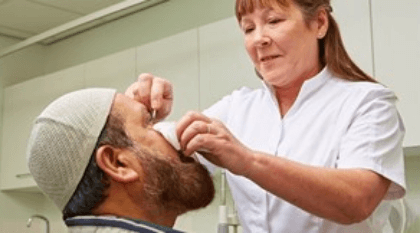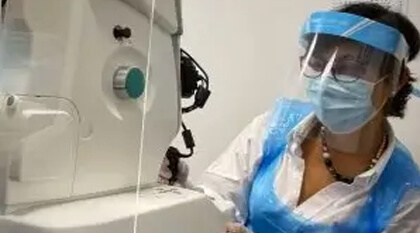Diabetic Eye Screening in the Republic of Ireland is an innovative and diverse service that is truly tailored to its population.
The importance of diabetic eye screening
If you are living with diabetes it is vital that you get your regular check for diabetic retinopathy screening. This condition can lead to sight loss if not detected and treated. As a diabetic patient 12 years and over you are entitled to a regular screening appointment.
If you would like to know more about Diabetic Retinopathy or the screening services please visit About Diabetic RetinaScreen – HSE.ie
Please note online booking is not available for this programme
Programme Manager : Shane McMahon
How does it work?
Your screening appointment in 6 easy steps:

Your history
We will check and confirm your details before we start.

Testing Visual Acuity
In other words, we test how good your sight is. If you wear glasses please bring them to your appointment.

Dilation Drops
You may have blurred vision for up to 4-6 hours after your appointment. This is why you should not drive or operate machinery during this time. After the screening procedure, everything might look bright. You might want to wear sunglasses. Do not wear contact lenses for at least 2 hours after the eye drops are used.

Photographing the eye
We then use an advanced camera system to photograph different areas of the back of your eye.

Grading your eyes
The images of your eyes will be assessed after your appointment.

Results
You will receive your results within 3 weeks of your appointment.
Screening information in multiple languages
Click here to find out more information
Your Appointment

Your Appointment
When attending your appointment please bring the following with you:
- Please bring your current distance glasses – these are the pair you wear to watch TV or drive.
- Sunglasses can help reduce glare and may make exiting the appointment more comfortable.
At your appointment you will be asked for details of diabetes treatment and of any other eye conditions and any treatment you’ve had/ are having at hospital.
You will be asked to give consent to us to use eye drops.
The eye drops may cause your eyes to sting slightly, and after about 15 minutes your vision will be blurred. You may find it difficult to focus on objects that are close to you.
There will be a flash of light each time a photograph is taken, but the camera will not touch your eye.
Your screening appointment should last about 30 minutes.
Venues and transport to your appointment

Venues and transport to your appointment
Venues
Since the COVID-19 outbreak, due to the increased risk of infection to people with diabetes and staff, we are unable to return to many of the local GP surgeries we used before the pandemic. This means you may not get offered an appointment at your usual venue. Please accept our apologies for the inconvenience and be assured that the new venue will be the closest we can offer, and will have more choice of appointment dates and times and be near to bus routes from many localities.
Transport to your appointment
We recommend you do not drive to your eye screening appointment as your pupils will be dilated to enable us to take photographs of the back of the eye, and this causes blurred vision for up to 4-6 hours afterwards. If you cannot use public transport you many need friends or family to bring you to your appointment.
Unfortunately NEC Care cannot provide transport for any patients who need it. If you require an appointment at a particular time of the day please contact the administration team so an appropriate appointment can be made for you.
The Dilation Eye Drops

The Dilation Eye Drops
We will test your eyes using Minims Tropicamide 1.0% eye drops. In some situations some services may also use Phenylephrine 2.5% . Leaflets about the drops are available at all screening appointments. It’s extremely rare, but you may experience a reaction to these drops. If you – or the person you’re caring for – have any of the following symptoms, contact your local A&E department.
- severe eye pain
- nausea and vomiting
- headache
- blurred vision and/or seeing halos around lights
- profuse tearing
- palpitations (only relevant if Phenylephrine drops are used).
- Redness and itching of your eyes
The eye drops we’ve used last for 4-6 hours. If your vision has not returned to normal after 4-6 hours you should seek medical assistance.
Do not drive or operate heavy machinery during this time as the drops used at the screening appointments are designed to widen your pupils (dilation). Dilation can temporarily affect your vision, and you may not be able to read to the required legal distance. Please try to avoid driving following your screening appointment.
The drops may cause a small stinging sensation in your eyes. This will last for a few seconds only. It is similar to getting some soap in your eye.
We would always recommend dilation as the drops allow the screeners to take clear images of your retina, ensuring sight threatening changes are not missed. If you have concerns about the dilation drops, please discuss this with the screener at your appointment. You may be required to have another appointment.
Disabilities

Disabilities
Living with a physical disability?
Do you have everything you need to come to an eye screening appointment with us? All our screening venues are accessible for people using wheelchairs, and many have the hearing loop system, where you see this logo.

Our friendly staff will do what they can to help you on arrival or call 1800 992968 in advance for specific help.
Living with a learning disability?
Do you or someone you support have learning disabilities that make attending appointments difficult? Would you like help to make coming to eye screening easier?
Please get in touch so that we can work with you on your needs – we can provide familiarisation sessions or other aids to make eye screening as safe and easy as possible.
Tel: 1800 992968 to discuss.
FAQs
Retinal screening is an important part of diabetes care. Diabetes can affect the small blood vessels at the back of your eye, the retina. The effects of diabetic retinopathy can lead to damage to your eyesight if left untreated. Regular eye screening will check your retina for any signs of diabetic retinopathy and help manage any follow requirements that may be needed. It is important to keep your eye screening appointments when invited.
At your eye screening appointment, one of our highly trained retinal screeners will take photographs of the back of your eyes and check for any signs of diabetic retinopathy.
It is important that the Diabetic Eye Screening Programme have an updated mobile number on file for you. When you arrive at your screening appointment, you currently may not be permitted to enter the building until called by your screener to enter. If unsure, please check with the screening venue
The screener will call you into the screening room when ready for your appointment, introduce themselves and check consent for the screening process.
The screener will then ask some questions regarding any relevant medical history that will help understand individual needs for ongoing care.
You will be asked to undertake a quick visual check by reading letters off a chart.
At this point of the appointment, the screener will place some drops into your eyes. This will dilate your pupils to allow for the photographs to be taken.
Once you are comfortable, the screener will ask you to take a seat outside for around 20 minutes while the drops take effect.
The screener will invite you back into the room, after the 20 minutes and will ask you to sit in front of the retinal camera.
A minimum of 3 photographs of each eye will be taken by the screener. The photographs do not hurt; however there will be a bright flash from the camera.
When all the images have been captured that are required, the screener will explain what will happen next and when to expect your results.
In some cases, you may be asked to attend more frequently. Some examples are below for why we are reinviting you for screening.
- If the images captured at your appointment are not clear, then another appointment will be made for you. There are several reasons you may need a second appointment eg if you have Cataract which is affecting the quality of the images or if we have been unable to fully dilate your pupils. This is called a Slit Lamp Biomicroscopy assessment where a different piece of equipment will be used to try to get a clear view of the back of your eye
- We may need to monitor your retina on a more frequent basis. If this is the case, we will invite you to a Digital Surveillance Clinic where the process is very similar to your normal appointment checks. We may invite you to this clinic if there is Diabetic Retinopathy that we want to monitor for progression but does not require hospital treatment
Standard intervals between screening are annual and biennial. Due to the COVID-19 pandemic, some appointments may be delayed. Please see our questions specifically regarding the COVID-19 pandemic and how we are managing your appointments.
Many opticians are able to take images of your eye for a charge, but may not be part of the National Screening Service. Therefore your test will not be recognised as part of the screening service. Opticians will check your vision, so it is important to keep both your opticians and your retinal screening appointments.
We would always encourage you to take up invitations for your retinal screening when you are invited, but we understand that sometimes now might not be the best time to attend and there may be a more convenient time for you. Changes to your appointment can be made by contacting our central administration team.
Postponing your appointment
If right now isn’t a convenient time to attend, and you need to reschedule for a few months time, the admin team may offer to postpone your appointment. This will temporarily change the period that you will be invited for screening. Once the period has ended another appointment will be sent to you.
Opting Out
Every person with diabetes has the right to decide to attend screening. You may wish to opt out of screening. If this is the case the administration team will discuss the options with you . In line with National Guidelines you have the right to opt out of screening for 1,2 or 3 years. As this is a serious decision and could affect your vision, please discuss any options with your GP before opting out of screening.
If you have chosen to postpone or opt out of screening for any length of time the administration team can invite you sooner. Please let us know if you would like to be invited.
Sometimes the ability to complete a successful screening appointment can be affected by other medical conditions that our service users may have. In all instances, screening will be offered until further details are understood and we encourage attendance to attempt screening. There are a few things that need to be considered;
- Does the person fully understand the procedure and have the capacity to consent to the procedure?
- Does the patient require assistance? If so, we would ask someone to accompany them to their appointment
- Is the person able to sit up and support themselves at our equipment?
- Retinal camera’s require someone to be able to place their chin onto a chin rest and sit forward for a few moments. If someone is bed bound or unable to sit forward, please contact our administration team on 1800 992969 to discuss their options
If you are a ward of court for a person requiring screening, then you are legally entitled to give consent on behalf of the person for the screening procedure. Please ensure to bring the necessary legal documentation with you to the screening appointment.
If you change address, please inform our administration team on 1800 992968 as soon as possible. If your new location falls out of our screening area, we will transfer you to the appropriate service
You will receive a letter with your eye screening results within 3 weeks of your appointment. The results will also be sent to your GP and your nominated eye doctor.
Your letter will tell you that you have one of the following:
- No retinopathy
- Background retinopathy
- Pre-proliferative retinopathy
- Proliferative retinopathy
- Diabetic macular oedema
No retinopathy
This means no signs of retinopathy were found. You should attend your usual screening appointment next year.
If you have a result of no retinopathy from your previous 2 screenings, your next screening invitation will be 2 years from the time of their last screen.
This will reduce the number of screening appointments and reduce unnecessary clinic visits and examinations.
If your next screening result detects retinopathy, you will be returned to annual screening or referred for treatment.
People who have had 2 consecutive results of no retinopathy have been found to be at very low risk of progressing to retinopathy between screens.
If you have sight problems between screening appointments, get medical advice straight away. Do not wait until your next screening appointment. These changes could include sudden vision loss, sensitivity to light or a deterioration in your vision.
Background retinopathy
This means you have minor signs of retinopathy. You do not need treatment, but you’ll need to take care to prevent the problem getting worse. It’s important that you go to your usual screening appointment next year.
Pre-proliferative retinopathy
This means you have changes to your retina due to diabetes. We will refer you to an eye specialist in a diabetic retinopathy clinic. They will send you an appointment letter so you can be closely monitored.
Proliferative retinopathy
This means you have significant changes to your retina which may result in loss of vision.
A referral will be made on your behalf to an ophthalmology clinic.
It is very important that you attend this appointment for treatment.
Diabetic macular oedema
This means blood vessels have leaked fluid into the centre of your retina (called the macula) causing swelling.
A referral will be made on your behalf to an ophthalmology clinic.
It is important that you attend this appointment for treatment.
Many eye conditions will be reviewed similarly. Unless the eye screening service is specifically informed by the eye hospital that your Diabetic Retinopathy is being managed by them, you will be invited for community screening.
Reviews for conditions such as Glaucoma, Macula Degeneration and Cataracts may require an Ophthalmologist to review your retina, but they may not record the presence of Diabetic Retinopathy, so it is important you attend both your screening and your hospital appointments.
If you believe you are under the hospital and that diabetic retinopathy is being managed, please contact us.
Receiving a positive result can be alarming, but in the majority of cases the important detail is making sure any follow-up appointments are kept. Diabetic Retinopathy is treatable and sight loss is preventable if detected early and treated.
If you have been referred to a hospital, it is important that the appointment is attended and treatment received if required.
If your results state that another appointment will be offered for monitoring, we will offer you another appointment, and it is important that efforts are made to keep the appointments, so progression can be checked.
If you are concerned about your results please do not hesitate to contact us, so we can arrange someone to discuss the results with you.
If you have received a letter from us stating that another appointment is needed as the images captured at your appointment were not clear there are a couple for reasons for this:
- Another eye condition, such as cataracts, has prevented us from seeing your retina
- Dilation wasn’t adequate for the grading to see all parts of your retina
- A technical issue has occurred and another test is required.
In all circumstances we will let you know if another appointment is needed. Please attend this next appointment.
The effects of diabetes on the small blood vessels around your body can take time to appear.
Changes to your diet and lifestyle may have reduced your HbA1c to a “Diabetes Resolved” level, which is fantastic, but to ensure your eyesight is protected we will continue to offer you screening.
Tel: 1800 992 968
Email: irelanddrsadmin@necsws.com
Your local centre
Appointments & Enquiries for Screening Locations
For more information on our active screening locations, please visit Diabetic RetinaScreen – Screening locations – HSE.ie
Ireland Self Registration Office
Diabetic RetinaScreen
PO Box 2
Limerick
Tel: 1800 45 45 55
Email: info@diabeticretinascreen.ie
Ireland Appointments and Bookings Office
NEC Care
Matthew House – 3rd Floor
Fr Matthew Street
Cork City,
County Cork,
Ireland
T12 TN56
Tel: 1800 992 968
Email: irelanddrsadmin@necsws.com
Meet the Manager
Programme Manager – Shane McMahon
Hi, I’m Shane McMahon, Programme Manager for the Ireland DESP. I joined NEC Care in November 2018, and have a particular interest in people management, process improvement, organisational change and stakeholder engagement. I have a background in optometry so am acutely aware of the patient journey, pathology and healthcare which has helped me understand the needs of the screening service. I’ve recently completed a Masters in Business Administration which has helped me better meet the challenges we face, and constantly improve as a company providing the screening service. I love to listen to and play music, read, surf and watch/play football – I am a Liverpool supporter. I love to cook, and nothing makes me happier than being in the kitchen with multiple recipes on the go, a glass of wine in hand and surrounded by family. I am from Northern Ireland originally but am very settled in Cork.
If you need any advice and support or wish to raise concerns about the Ireland DESP, I will be very pleased to help you. In the meantime, keep safe and well.
